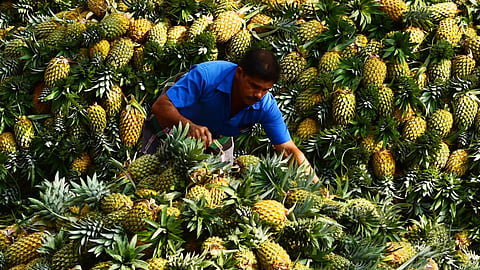

KOCHI: The pineapple farmers of Vazhakulam are in high spirits as summer rains have improved the chances of a good harvest. This is on the back of their efforts at tapping more export markets yielding fruit. The Vazhakulam pineapple market sends around 1,500 tonnes of the tropical fruit daily to various parts of the country.
While domestic markets account for nearly 98% of the sales, farmers and the Agricultural and Processed Food Products Export Development Authority (APEDA) are now eyeing more foreign markets.
“Normally, North Indian demand peaks during summer and the marriage season. Business was good this Ramadan. Though summer is peaking, the rise in production of watermelon has affected our market. But, due to the summer rains we are harvesting good quality fruit with the price ranging from Rs 32-36 per kg. Though this was Rs 40 in 2024, last year’s crop was much smaller,” said All Kerala Pineapple Farmers’ Association president James George.
Though pineapple is also grown in Tamil Nadu, Karnataka, Maharashtra and other states, Kerala farmers have an advantage in terms of their crop enjoying better taste and quality. The Kerala pineapple is in high demand in almost all northern states.
As production has increased, farmers are facing a challenge in finding new markets and export demand provides them a ray of hope.
“Though we export to some West Asian countries by air, freight charges — at Rs 90/kg and Rs 55 per carton — are exorbitant. This makes exports unviable. Now, some farmers have started exporting pineapple by sea, which is affordable. At Rs 20/kg, export by sea allows us to provide the fruit at reasonable rates to customers,” said James.
This was pioneered by Manna Pineapples, a joint venture of Sibi George and Green Vincent, which started exporting the fruit by sea last month. “We have sent three containers to the Dubai market over the past two months, and the response has been encouraging. We send the consignments by reefer containers, which help preserve the fruit in ample temperature.
A consignment reaches Dubai on the eighth day and the agent has had no complaints about quality. Now, we are getting many enquiries from European countries and Israel. The biggest challenge is transit time. It will take 23 days for a consignment to reach Europe and it is important to deliver the fruit without compromising on quality,” said Sibi.
“Exporting pineapple by sea is a major challenge,” he said. Around six years ago, we had orders from Israel. But all efforts at meeting this demand, with technical support from the Pineapple Research Centre, proved unsuccessful. Agents in Israel said it would have been profitable even if a third of the consignment had rotted as the market yielded better prices.
Recently, we started sending small quantities of pineapple to Dubai along with vegetables. And as we were able to determine the ample temperature to keep the fruit fresh, it became viable. Now, efforts are on to send an experimental consignment to the United Kingdom,” he said.
According to farmers, reefer containers can keep the quality of consignments intact for up to 23 days. Currently, around 90% of pineapple is sent to North Indian markets by truck, which takes around six days.
“The biggest advantage of pineapple is the absence of chemicals. While traders spray chemicals on other fruits like mango to avoid maggots, there is no need to use chemicals on pineapple. Thus has helped impress customers in Dubai,” said Sibi.
The support provided by APEDA in exploring markets for GI-tagged fruits has proved beneficial for farmers. “The authority’s market intervention saves farmers from a crash in prices. Around two months ago it procured around 5,000 tonnes, which ensured better prices for farmers.
1,500 tonnes of Vazhakulam pineapples are sent daily to various parts of the country
98% of products are sold domestically